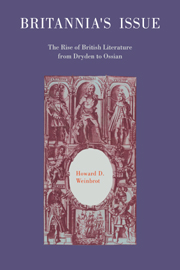Book contents
- Frontmatter
- Contents
- Acknowledgments and editorial notes
- INTRODUCTION: An overview of scope and method
- PART I CONTEXTS: INTELLECTUAL, PSYCHOLOGICAL, AND NATIONAL
- Prologue to Part I
- 1 MODERNS, ANCIENTS, AND THE SECULAR: THE LIMITS OF SOUTHERN HEGEMONY
- 2 THE SPIRITUAL: TRUTH WAS NOT THE INCLINATION OF THE FIRST AGES
- 3 AN AMBITION TO EXCEL
- 4 THE MAKING OF A MODERN CANON
- PART II TEXTS WITHIN CONTEXTS. ESSAYING ENGLAND: OUR GENIUS, OUR CLIME
- PART III GROWING ONE'S OWN. THE BRITISH ODE FROM COWLEY TO GRAY
- PART IV EXPANDING THE BORDERS. JEWS AND JESUS: THIS ISRAEL, THIS ENGLAND
- PART V CELTS, GERMANS, AND SCOTS: TOWARDS A UNITED KINGDOM
- APPENDIX: The text of Handel's “Israel in Egypt”
- Index
4 - THE MAKING OF A MODERN CANON
Published online by Cambridge University Press: 15 December 2009
- Frontmatter
- Contents
- Acknowledgments and editorial notes
- INTRODUCTION: An overview of scope and method
- PART I CONTEXTS: INTELLECTUAL, PSYCHOLOGICAL, AND NATIONAL
- Prologue to Part I
- 1 MODERNS, ANCIENTS, AND THE SECULAR: THE LIMITS OF SOUTHERN HEGEMONY
- 2 THE SPIRITUAL: TRUTH WAS NOT THE INCLINATION OF THE FIRST AGES
- 3 AN AMBITION TO EXCEL
- 4 THE MAKING OF A MODERN CANON
- PART II TEXTS WITHIN CONTEXTS. ESSAYING ENGLAND: OUR GENIUS, OUR CLIME
- PART III GROWING ONE'S OWN. THE BRITISH ODE FROM COWLEY TO GRAY
- PART IV EXPANDING THE BORDERS. JEWS AND JESUS: THIS ISRAEL, THIS ENGLAND
- PART V CELTS, GERMANS, AND SCOTS: TOWARDS A UNITED KINGDOM
- APPENDIX: The text of Handel's “Israel in Egypt”
- Index
Summary
The growing individual and national confidence thus far chronicled clearly raised questions regarding literary production. To what degree did achievement equal pretension? Did British letters really equal the classics? Was there life after Shakespeare's, or Milton's, or Dryden's death? Did the certainly free British write as well, or better, than the certainly enslaved French? Would Britannia's issue actually extend beyond sight, or even beyond the seventeenth century?
For such questions established authors like Chaucer, Spenser, Shakespeare, and Milton could offer only partial answers. By the later seventeenth century each was or soon would be canonized in both senses, and with varying consistencies and colleagues. The frontispiece to William Winstanley's Lives of the … English Poets (1687), for example, shows laurelled, immortal Shakespeare in the company of other immortals like Homer, Ovid, Ennius, Pindar, Horace, Virgil, Chaucer, and Cowley. In Giles Jacob's Poetical Register (1719), however, Shakespeare is in entirely British company. His engraving is the center around which, clockwise from nine o'clock, we see Beaumont, Jonson, Fletcher, Wycherley, Dryden, and Otway. The two illustrations represent different stages in awareness of native literary greatness. For Winstanley, Shakespeare's greatness is testified by six classical and two British poets. For Jacob, Shakespeare's greatness is testified by six British dramatists. He has become the great sun around which lesser but also great and very different native satellites revolve.
By the middle years of the eighteenth century Britain's view of its chief poets had undergone significant changes. The often modernized Chaucer moves from linguistic barbarian to paternal ancestor respected for his accomplishments and for his early version of the rough but natural British voice.
- Type
- Chapter
- Information
- Britannia's IssueThe Rise of British Literature from Dryden to Ossian, pp. 114 - 142Publisher: Cambridge University PressPrint publication year: 1993



